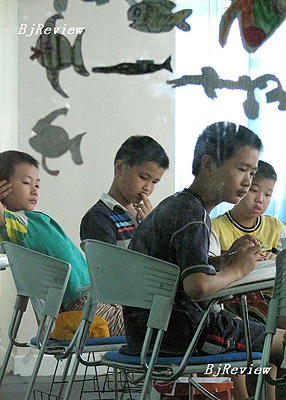
Most Favored Employers Lack Dynamism
July is the month for Chinese college graduates to leave school and start a career. According to a recent survey, on the Chinese mainland, the most favored employers are listed as China Mobile, China Telecom and Sinopec-all are state-owned enterprises.
In some sense, college graduates are rational in choosing these enterprises, which are known to be able to provide high salaries and stable positions.
However, the so-called advantages of these enterprises are results of monopoly, rather than free market competition. Without the monopoly status granted by the government, it's doubtful whether these enterprises can survive.
It's easy to see that many state-owned enterprises are overstaffed and privileges are granted according to how many years a person has worked there. Thus, these enterprises generally lack a dynamic environment.
It's not that state-owned enterprises are unsuitable for young people, but under a relatively ineffective system, for some of them, it's a waste of individual talent.
For the enterprises, it's a pride and honor to top the graduates' favored employer list, but for society as a whole and overall economic development, maybe it's not that good.
Workers' Daily
Student Overload Detrimental in Long Term
Summer vacation is supposed to be a relaxing time when students get a break from their heavy workload. Unfortunately, they are soon thrown into various holiday training classes, despite orders from the Ministry of Education that no extra classes should be given during winter and summer holidays.
Why is there so much interest in making summer holidays a third semester? Primary and middle schools are partly to blame, but they seem to have no option. Schools are working hard to make sure that more students enter higher-level teaching institutions, despite their understanding that the kids need a break. Parents also do not want their children to sweat in classes during the hottest season of the year, but will not allow their children to fall behind others just because they are not sent to holiday auxiliary classes. As for students themselves, they can only listen to schools and parents.
Then who is responsible for this punishing schedule during the holidays? The blame must lie with the current exam-oriented education system. As long as it remains in place, it's basically impossible for students to get free time during their studying years.
Schoolwork is important, but it seems cruel to overload one's childhood with work at the expense of other interesting experiences. If they are overworked, how can they begin a new semester recharged and enthusiastic?
Changsha Evening News
Pork Prices Need Govt's Help
In response to soaring pork prices in recent months, some economists claim that it is a natural market response, so government interference is unnecessary and that the interference will make the price fluctuations more unpredictable and drastic.
When asked why pork prices have jumped higher, farmers said that the price of live pigs fell to a historical low half a year ago. At that time, most farmers felt pessimistic, believing they could no longer make money from pig farming. As a result, they gave up the centuries-old household business. Now, with a declining pig supply, the consequences were felt. It's said if the government did something to help the farmers when pig prices bottomed out, maybe the situation would be different now.
Actually, in many countries, agriculture is the area that receives most government subsidies, especially in developed world. This is probably because price tumbles in farm produce will affect people's stable lives and lead to social panic.
It's known by all that the market does sometimes fail, particularly an immature market like China. The government therefore has an important role to play in bringing the prices back to normal
Guangzhou Daily
Developers a Law Unto Themselves
In mid-June, a real estate developer in southwest China's Wanzhou County, under the jurisdiction of Chongqing Municipality, moved to tear down the office building of the local tourism bureau, without approval from construction and planning authorities and without agreement from the property owner. By the time local government had moved to stop the demolition, the roof of the building had been holed. Throughout the process, the developer repeatedly announced that it would not consider compensation until the demolition was finished.
Follow-up reports reveal that the former chief of the tourism bureau had signed a letter of intent with the developer to renovate the office building for commercial use, but, after he stepped down, the plan was shelved.
To maximize their profits, real estate developers are no longer satisfied with tearing down the houses of ordinary people. As long as there are profits to be made, no site is sacred, even government buildings cannot escape the fate of being pulled down.
If government property is not immune to illegal demolition, what chance do individuals' have? This really worries the public.
Qilu Evening News | 